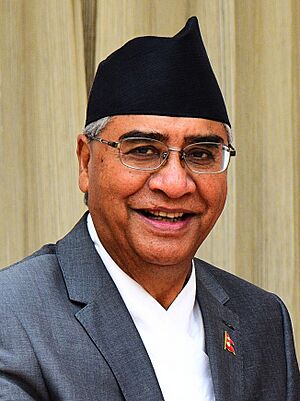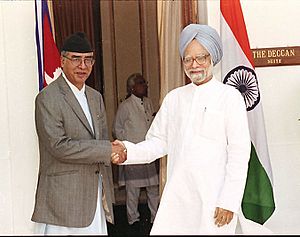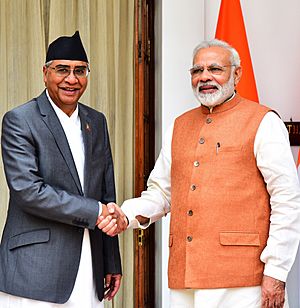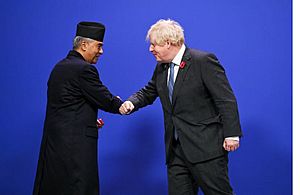Sher Bahadur Deuba facts for kids
Quick facts for kids
Sher Bahadur Deuba
MP
|
|||||||||||||||||||||||||||||||||||||||||||||||||||||||||||||||||||||
|---|---|---|---|---|---|---|---|---|---|---|---|---|---|---|---|---|---|---|---|---|---|---|---|---|---|---|---|---|---|---|---|---|---|---|---|---|---|---|---|---|---|---|---|---|---|---|---|---|---|---|---|---|---|---|---|---|---|---|---|---|---|---|---|---|---|---|---|---|---|
|
शेर बहादुर देउवा
|
|||||||||||||||||||||||||||||||||||||||||||||||||||||||||||||||||||||

Deuba in New Delhi
|
|||||||||||||||||||||||||||||||||||||||||||||||||||||||||||||||||||||
| 32nd Prime Minister of Nepal | |||||||||||||||||||||||||||||||||||||||||||||||||||||||||||||||||||||
| In office 13 July 2021 – 26 December 2022 |
|||||||||||||||||||||||||||||||||||||||||||||||||||||||||||||||||||||
| President | Bidya Devi Bhandari | ||||||||||||||||||||||||||||||||||||||||||||||||||||||||||||||||||||
| Preceded by | Khadga Prasad Sharma Oli | ||||||||||||||||||||||||||||||||||||||||||||||||||||||||||||||||||||
| Succeeded by | Pushpa Kamal Dahal | ||||||||||||||||||||||||||||||||||||||||||||||||||||||||||||||||||||
| In office 7 June 2017 – 15 February 2018 |
|||||||||||||||||||||||||||||||||||||||||||||||||||||||||||||||||||||
| President | Bidya Devi Bhandari | ||||||||||||||||||||||||||||||||||||||||||||||||||||||||||||||||||||
| Deputy | Bijay Kumar Gachhadar | ||||||||||||||||||||||||||||||||||||||||||||||||||||||||||||||||||||
| Preceded by | Pushpa Kamal Dahal | ||||||||||||||||||||||||||||||||||||||||||||||||||||||||||||||||||||
| Succeeded by | Khadga Prasad Oli | ||||||||||||||||||||||||||||||||||||||||||||||||||||||||||||||||||||
| In office 4 June 2004 – 1 February 2005 |
|||||||||||||||||||||||||||||||||||||||||||||||||||||||||||||||||||||
| Monarch | King Gyanendra | ||||||||||||||||||||||||||||||||||||||||||||||||||||||||||||||||||||
| Preceded by | Surya Bahadur Thapa | ||||||||||||||||||||||||||||||||||||||||||||||||||||||||||||||||||||
| Succeeded by | Girija Prasad Koirala | ||||||||||||||||||||||||||||||||||||||||||||||||||||||||||||||||||||
| In office 26 July 2001 – 4 October 2002 |
|||||||||||||||||||||||||||||||||||||||||||||||||||||||||||||||||||||
| Monarch | King Gyanendra | ||||||||||||||||||||||||||||||||||||||||||||||||||||||||||||||||||||
| Preceded by | Girija Prasad Koirala | ||||||||||||||||||||||||||||||||||||||||||||||||||||||||||||||||||||
| Succeeded by | Lokendra Bahadur Chand | ||||||||||||||||||||||||||||||||||||||||||||||||||||||||||||||||||||
| In office 12 September 1995 – 12 March 1997 |
|||||||||||||||||||||||||||||||||||||||||||||||||||||||||||||||||||||
| Monarch | King Birendra | ||||||||||||||||||||||||||||||||||||||||||||||||||||||||||||||||||||
| Preceded by | Man Mohan Adhikari | ||||||||||||||||||||||||||||||||||||||||||||||||||||||||||||||||||||
| Succeeded by | Lokendra Bahadur Chand | ||||||||||||||||||||||||||||||||||||||||||||||||||||||||||||||||||||
|
|||||||||||||||||||||||||||||||||||||||||||||||||||||||||||||||||||||
|
|||||||||||||||||||||||||||||||||||||||||||||||||||||||||||||||||||||
| Personal details | |||||||||||||||||||||||||||||||||||||||||||||||||||||||||||||||||||||
| Born | 13 June 1946 Ashigram, Kingdom of Nepal |
||||||||||||||||||||||||||||||||||||||||||||||||||||||||||||||||||||
| Political party | Nepali Congress (before 2002; 2007–present) | ||||||||||||||||||||||||||||||||||||||||||||||||||||||||||||||||||||
| Other political affiliations |
Nepali Congress (Democratic) (2002–2007) | ||||||||||||||||||||||||||||||||||||||||||||||||||||||||||||||||||||
| Spouse | Arzu Rana Deuba | ||||||||||||||||||||||||||||||||||||||||||||||||||||||||||||||||||||
| Alma mater | Tribhuvan University, LSE | ||||||||||||||||||||||||||||||||||||||||||||||||||||||||||||||||||||
| Signature | |||||||||||||||||||||||||||||||||||||||||||||||||||||||||||||||||||||
Sher Bahadur Deuba (शेरबहादुर देउवा; born 13 June 1946) is a well-known Nepali politician. He has served as the Prime Minister of Nepal five times. He is also the president of the Nepali Congress political party, a role he has held since 2016. Mr. Deuba represents the Dadeldhura 1 area in the Parliament.
He was born and grew up in a small village called Ashigram in Dadeldhura. He went to school there and later studied at Tri-Chandra College in Kathmandu. In 1991, he became a member of the Parliament and served as the Minister of Home Affairs. He first became Prime Minister in 1995.
Contents
Early Life and Education
Sher Bahadur Deuba was born on June 13, 1946, in Ashigram, a village in Dadeldhura. He started his schooling at Ashigram Primary School. Later, he went to Mahendra High School in Doti to complete his secondary education.
After finishing high school, he moved to Kathmandu for further studies. In 1963, he joined Tri-Chandra College. In 1988, he received a scholarship to study political science at the London School of Economics in London, UK.
Political Journey
Starting in Politics (1963–1990)
Mr. Deuba began his political journey in 1963. He was a member of the Far Western Zonal Student Union. This group was started by students from the Far-Western Development Region who were studying in Kathmandu.
While at Tri-Chandra Multiple Campus, he joined the Student Rally Coordination Committee. In 1970, he helped create the Nepal Student Union. The next year, he became its president and led the union for eight years. During the 1970s and 1980s, he was arrested and spent nine years in jail. This was because he was involved in activities that supported democracy in Nepal.
Multi-Party System (1991–2002)
After the 1990 revolution, Nepal moved towards a multi-party system. Mr. Deuba returned from London and was elected to Parliament from Dadeldhura 1 in the 1991 election. He became the Home Minister in the government led by Girija Prasad Koirala.
He was re-elected from Dadeldhura 1 in the 1994 election.
First Time as Prime Minister (1995–1997)
Mr. Deuba became Prime Minister for the first time in 1995. He had the support of other political parties. During his time as Prime Minister, his government signed the Mahakali treaty with India. This treaty was about sharing water resources. His government also introduced a system for voter identification cards. They also worked to end dual ownership of land.
His government supported economic liberalization, which meant making it easier for businesses to operate. They also introduced Value-added taxes. Mr. Deuba visited India, China, Pakistan, the United Kingdom, and the United States as Prime Minister. He resigned in March 1997.
Second Time as Prime Minister (2001–2002)
In July 2001, Mr. Deuba became Prime Minister for the second time. His government tried to talk with a group called the Maoists, who were fighting against the government. They agreed to a ceasefire to allow for talks. His government also started programs to improve land ownership, end social discrimination, and give women more property rights.
When the talks failed, the Maoists started their attacks again. In February 2002, a state of emergency was declared for six months. The local elections that were planned for July 2002 were also postponed because of the increased fighting. Mr. Deuba asked King Gyanendra to dissolve the parliament and call for new elections. However, his government could not hold the new elections. King Gyanendra removed him from office in November 2002. Many people saw this as an unfair move by the King, and there were protests.
Nepali Congress (Democratic) (2002–2007)
After being removed from office, Mr. Deuba was also expelled from the Nepali Congress party. He then formed his own party called Nepali Congress (Democratic).
Third Time as Prime Minister (2004–2005)

After many protests from political parties, King Gyanendra allowed the parties to choose the next Prime Minister. Since they could not agree, Mr. Deuba was appointed Prime Minister again in June 2004.
He remained Prime Minister until February 1, 2005. At that time, the King took control of the government and placed many politicians, including Mr. Deuba, under house arrest. Mr. Deuba was later released from prison after the Supreme Court said his arrest was against the law. In September 2007, his party, Nepali Congress (Democratic), rejoined the original Nepali Congress.
Constituent Assembly (2008–2015)
Mr. Deuba was elected from Dadeldhura 1 in the 2008 Constituent Assembly election. The Constituent Assembly was a special group formed to write a new constitution for Nepal. He was also re-elected from Dadeldhura 1 in the 2013 Constituent Assembly election.
President of Nepali Congress (2016–Present)

In 2016, Mr. Deuba ran for the position of party president at the 13th general convention of the Nepali Congress. He won the election and became the president of the party.
Fourth Time as Prime Minister (2017–2018)
In August 2016, the Nepali Congress and another party, CPN (Maoist Centre), agreed to share the government. As part of this agreement, Mr. Deuba became Prime Minister for the fourth time on June 7, 2017. His government successfully held elections for all three levels of government in 2017. He was re-elected to Parliament from Dadeldhura 1 in the 2017 election. He resigned in February 2018 to allow a new government to form.
Fifth Time as Prime Minister (2021–2022)
In July 2021, the Supreme Court ordered that Mr. Deuba be appointed Prime Minister. He was then appointed Prime Minister for the fifth time by President Bidya Devi Bhandari.
In December 2021, he was re-elected as the president of the Nepali Congress party at their 14th general convention. He was also re-elected to Parliament from Dadeldhura 1 in the 2022 election. After the election, Pushpa Kamal Dahal replaced him as Prime Minister.
Personal Life
Sher Bahadur Deuba is married to Arzu Rana Deuba. They have a son named Jaiveer Singh. In November 2016, he received an honorary doctorate degree from Jawaharlal Nehru University in India.
Election Results
| Election | House | Constituency | Party | Votes | Result | |
|---|---|---|---|---|---|---|
| 1991 | House of Representatives | Dadeldhura 1 | Nepali Congress | 24,570 | ||
| 1994 | House of Representatives | Dadeldhura 1 | Nepali Congress | 20,701 | ||
| 1999 | House of Representatives | Dadeldhura 1 | Nepali Congress | 28,651 | ||
| 2008 | Constituent Assembly | Dadeldhura 1 | Nepali Congress | 20,529 | ||
| Kanchanpur 4 | 12,824 | |||||
| 2013 | Constituent Assembly | Dadeldhura 1 | Nepali Congress | 23,920 | ||
| 2017 | House of Representatives | Dadeldhura 1 | Nepali Congress | 28,446 | ||
| 2022 | House of Representatives | Dadeldhura 1 | Nepali Congress | 25,534 | ||
See also
 In Spanish: Sher Bahadur Deuba para niños
In Spanish: Sher Bahadur Deuba para niños
- Nepali Congress (Democratic)
 | Selma Burke |
 | Pauline Powell Burns |
 | Frederick J. Brown |
 | Robert Blackburn |


